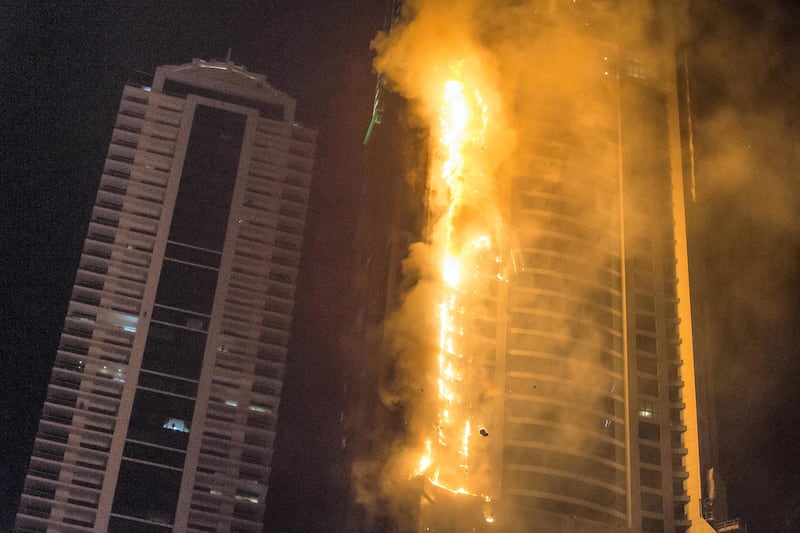Developers are hiring fire experts to assess the aluminium cladding on apartment blocks but more owners must come forward to evaluate risks and formulate strategies to ensure the safety of residents.
Regular maintenance of safety equipment, fire drills and strict enforcement of fines is key to keeping older buildings with flammable aluminium cladding safe from fires, experts said.
Authorities are currently working with experts to study if fire barriers can be added to delay the spread of a blaze in buildings with aluminium panels with a combustible thermoplastic core. But these are long-term measure and experts said other important steps can be taken in the interim.
_______________
Related:
[ Tough fines and enforcement needed in UAE buildings to boost fire safety ]
[ Does your building have a fire strategy? ]
_______________
“I don’t believe we can do it with one entity like an authority going around and looking at all the buildings. The way to do it is to ask anyone who owns the buildings to make that assessment and pool all that information,” said Andy Dean, head of facades at engineering firm WSP.
“Everybody who owns a building really ought to be thinking about assessing their level of risk because, until you know the nature and extent of the problem, how can you fix it?
“So either a homeowners’ association or an office landlord gets involved, whoever is charged with the responsibility of that building. I can’t see any good reason why anyone would wait any longer.”
A basic assessment to sketch out the extent of problems can cost a developer just Dh20,000.
“Nobody wants to be alarmist but a lot of the more responsible developers and building owners are assessing their building stock. They are looking for expert advice, some of them on a single building basis, to make that initial assessment and understand where the problems are and trying to quantify it,” Mr Dean said.
“You don’t have to spend a fortune doing it but it’s money well spent.”
There have been strong calls for enhanced safety after the second fire in as many years recently gripped Dubai Marina’s The Torch tower, one of the world’s tallest residential buildings, and the tragic Grenfell Fire in London that killed 79 people, fuelled by flammable aluminium panelling.
Cladding has also fuelled the flames in at least five major tower fires in the UAE over the past five years.
Of these, Dubai Police said that the 2012 fire in Tamweel Tower in Jumeirah Lakes Towers was caused by a cigarette butt thrown into a waste bin containing flammable material including paper.
_________________
Read more:
[ Home insurance sales up after Torch fire but ‘residents lack knowledge of coverage’ ]
[ Dubai's Torch tower residents move back in to their apartments ]
[ Dubai Torch tower fire: internal e-mail shows repairs from first blaze had just been approved ]
_________________
Experts have estimated that between 65 to 70 per cent buildings in the UAE have some form of aluminium panels surrounding a thermoplastic core, but civil defence officials have refuted the figure, saying that a much smaller percentage of buildings had non-fire rated exterior cladding. Official data is not available.
Authorities in the UAE banned this cladding following the federal 2012 Fire and Life Safety Code but concerns remain for buildings constructed before the code.
While the cost to replace the entire cladding is prohibitive and, in many cases, not possible due to the placement and coverage of the exterior covering, occupants must be more aware of the risks.
“Yes, the cladding is flammable but we need to make sure that maintenance is being done right. It’s an interesting challenge that we have to get people to understand that it’s flammable material but it does not just spontaneously combust. It combusts because someone has ignited it. Education needs to be stressed,” said Douglas Ralph, chief executive of Snap & Inspect, a property consultancy firm and also president of the Middle East Real Estate Inspection Association.
“You do not smoke a cigarette close to an open can of gasoline. We all know better than that. The cladding is the same. We know the cladding is flammable, so why are the residents using barbecue grills or shisha charcoal on the balconies? Why are they smoking and dropping their cigarettes off the building? The building security needs to get much stronger.
“If someone uses a barbecue grill, they should be fined. We have to look at the big picture.
The cladding is the problem but it will take a long time to come up with a good plan for all the different styles of buildings and it’s going to be costly. Our big challenge is educating people so they stop having the attitude it’s okay for them to still have a shisha or barbecue on their balcony.”






